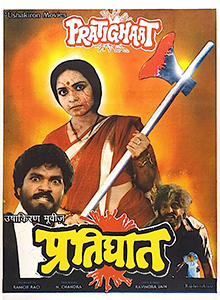Pratighaat (1987 film)
Pratighaat (transl. The Revenge) is a 1987 Hindi feminist drama film directed by N. Chandra, starring Sujata Mehta as lead.[1] It was a remake of the Telugu film Pratighatana (1986), directed by T. Krishna, with Vijayshanti as the lead.[2] The film deals with politics-criminal nexus and a college lecturer who takes them on, even after she faces public disrobing.[3][4]
| Pratighaat | |
|---|---|
 Poster | |
| Directed by | N. Chandra |
| Produced by | Ramoji Rao |
| Screenplay by | T. Krishna N. Chandra Jalees (dialogue) |
| Story by | T. Krishna |
| Based on | Pratighatana by T. Krishna |
| Starring |
|
| Music by | Ravindra Jain |
| Cinematography | H. Laxminarayan |
| Edited by | N. Chandra |
Production company | |
Release date |
|
Running time | 164 minutes |
| Country | India |
| Language | Hindi |
Made on a low-budget, and no big stars, it went on to become a hit, making Rs. 8 crore at the box office.[5] It became part of the hat-trick of hit films by N. Chandra, Ankush (1986), Pratighaat and Tezaab (1988).[2]
Cast
- Sujata Mehta as Laxmi S. Joshi
- Arvind Kumar as Advocate Satyaprakash Joshi
- Charan Raj as Kali Prasad
- Rohini Hattangadi as Durga
- Mohan Bhandari as Inspector Ajay Srivastav
- Ashok Saraf as Lawyer
- Nana Patekar as Ex-Constable Karamveer
- Savita Bajaj as Mrs. Joshi
Music
- "Tere Sar Pe Mere" – S. Janaki, S. P. Balasubramanyam
- "Hamre Balma Beimaan" – S.P. Balasubramaniam
- "Likhungi Mahabharat Naya" – S. Janaki
- "Sara Nagar Aap Hi Ke Saath Hai" – Sushil Kumar, Mohammed Aziz
gollark: There was this thing with the virus scanner uploading new executables to the CLOUD™ and running them.
gollark: permission → explicit request to
gollark: Also, they can do search without using my data for targeted advertising and who knows what.
gollark: ... they *do*. Corporations aren't evil exactly, but they're amoral profit maximizers.
gollark: Also, while this isn't the same class of privacy issue as Google analytics tracking and whatnot, governments can use big piles of data to enhance control of the populace and stop dissent. Look at China.
References
- M.L. Dhawan (21 July 2002). "On the sands of time — 1987: Year of the invisible hero". The Sunday Tribune. Retrieved 24 September 2014.
- Madhu Jain (28 February 1989). "Mean street Moghul: Hit director N. Chandra brings realism to films". India Today. Retrieved 24 September 2014.
- "Politician-goonda emerge as the new villain". India Today. 15 September 1987. Retrieved 24 September 2014.
- Virdi, Jyotika (2003). The Cinematic ImagiNation: Indian Popular Films as Social History. Rutgers University Press. p. 55. ISBN 978-0-8135-3191-5.
- "In Indian politics, line between politicians and goondas is fast disappearing: N. Chandra". India Today. 15 September 1987. Retrieved 24 September 2014.
This article is issued from Wikipedia. The text is licensed under Creative Commons - Attribution - Sharealike. Additional terms may apply for the media files.